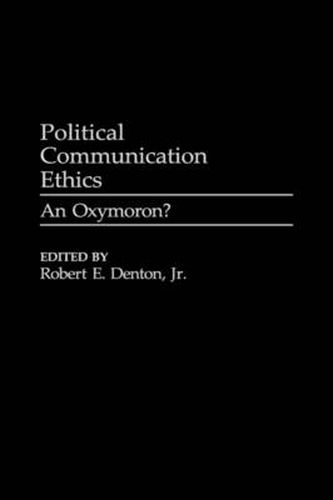Readings Newsletter
Become a Readings Member to make your shopping experience even easier.
Sign in or sign up for free!
You’re not far away from qualifying for FREE standard shipping within Australia
You’ve qualified for FREE standard shipping within Australia
The cart is loading…






This essay collection examines ethical concerns related to the traditional areas of political communication, including campaigns, media, discourse and advertising, as well as new technologies, including the Internet. The collection examines political ethics from an academic perspective rather than from a moralistic or rule orientation. The author provides an assessment of presidential campaigns, arguing that ethical judgements of citizens are based on candidates’ actions and motives, character, and competence. Ronald Lee explores the ethics of campaign discourse, and he charts the relationship between presidential candidates’ projection of civic virtue and the political arrangements that dictate the course of the campaign itself. Steven Goldzwig and Patricia Sullivan examine what happens to discourse when the divide between the haves and have-nots translates into a local community disconnected from virtual politics. The nature, types and impact of the growing use of hate speech in contempoary politics is explored by Rita Whillock, while Robert Denton investigates television as an instrument of governing and its impact on the nature of democracy.
$9.00 standard shipping within Australia
FREE standard shipping within Australia for orders over $100.00
Express & International shipping calculated at checkout
This essay collection examines ethical concerns related to the traditional areas of political communication, including campaigns, media, discourse and advertising, as well as new technologies, including the Internet. The collection examines political ethics from an academic perspective rather than from a moralistic or rule orientation. The author provides an assessment of presidential campaigns, arguing that ethical judgements of citizens are based on candidates’ actions and motives, character, and competence. Ronald Lee explores the ethics of campaign discourse, and he charts the relationship between presidential candidates’ projection of civic virtue and the political arrangements that dictate the course of the campaign itself. Steven Goldzwig and Patricia Sullivan examine what happens to discourse when the divide between the haves and have-nots translates into a local community disconnected from virtual politics. The nature, types and impact of the growing use of hate speech in contempoary politics is explored by Rita Whillock, while Robert Denton investigates television as an instrument of governing and its impact on the nature of democracy.